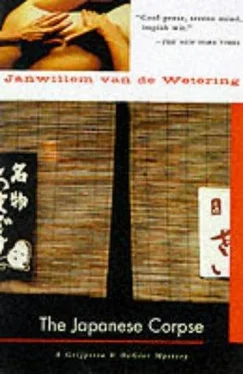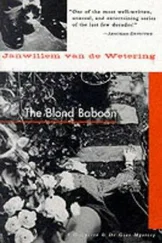Janwillem De Wetering - The Japanese Corpse
Здесь есть возможность читать онлайн «Janwillem De Wetering - The Japanese Corpse» весь текст электронной книги совершенно бесплатно (целиком полную версию без сокращений). В некоторых случаях можно слушать аудио, скачать через торрент в формате fb2 и присутствует краткое содержание. Жанр: Полицейский детектив, на английском языке. Описание произведения, (предисловие) а так же отзывы посетителей доступны на портале библиотеки ЛибКат.
- Название:The Japanese Corpse
- Автор:
- Жанр:
- Год:неизвестен
- ISBN:нет данных
- Рейтинг книги:3 / 5. Голосов: 1
-
Избранное:Добавить в избранное
- Отзывы:
-
Ваша оценка:
- 60
- 1
- 2
- 3
- 4
- 5
The Japanese Corpse: краткое содержание, описание и аннотация
Предлагаем к чтению аннотацию, описание, краткое содержание или предисловие (зависит от того, что написал сам автор книги «The Japanese Corpse»). Если вы не нашли необходимую информацию о книге — напишите в комментариях, мы постараемся отыскать её.
The Japanese Corpse — читать онлайн бесплатно полную книгу (весь текст) целиком
Ниже представлен текст книги, разбитый по страницам. Система сохранения места последней прочитанной страницы, позволяет с удобством читать онлайн бесплатно книгу «The Japanese Corpse», без необходимости каждый раз заново искать на чём Вы остановились. Поставьте закладку, и сможете в любой момент перейти на страницу, на которой закончили чтение.
Интервал:
Закладка:
"I see," the girl said, and poured the drinks. She smiled reassuringly at the poets. The poets still looked worried.
She went to them to spell out her message.
"It's all right," she said, "he is crazy too." * Cha means tea, O is a polite preface.
\\\\\ 14 /////
The Commissaris woke up because he dreamed that he had been caught up in a flood and washed down a sewer and that its creamy contents were bubbling and foaming up to his lips. He screamed and tore at the bed-sheets and rolled off the mattress onto the doormat, where he hurt his shoulder on the brass strap of his old-fashioned suitcase. He sat up, mumbling and rubbing his shoulder. De Gier was up too, standing with his back against the wall, the Walther gleaming in his hand, the barrel of the gun sweeping between the balcony doors and the door leading to the corridor.
"It's all right, sergeant," the commissaris said. "A bad dream. What's that terrible smell? Do you think they are having trouble with the sanitation here?"
De Gier put the gun back in the holster which was strapped over his pajamas, and stretched. He looked at his watch. "Five o'clock, sir, pretty early still, but I keep on waking up. They are making quite a racket in the temples across the street. Bells, clappers, gongs; must be a merry party. They were chanting too just now, deep voices, some religious ceremony, I suppose, I'll ask Dorin about it. It's amazing you didn't wake up. I thought they were in the garden, but I went on the balcony and it's coming from behind those high walls. I looked through the gate yesterday; the main templets another hundred yards behind the waU. The monks are getting up at three o'clock over there, every day I imagine. Must be a strange life."
"They wouldn't be causing that smell, would they?" the commissaris asked, wrinkling his nose. "Powerful smell, must be pure excrement, and human excrement too."
De Gier laughed and lay down. "Yes, sir, that's shit. There are no flush toilets here. The pipe leads to a wooden bucket and every day the buckets are picked up. That was the cart you are smelling; it came by a few minutes ago, a horse-drawn cart. Dorin says they call it the 'honey-cart.' It's the same all over Japan. They use it for manure here. Dorin was joking about it. 'The base of our economy is pure shit.'"
"Not a bad idea," the commissaris said. "Better than blowing it into the sea under pressure, as we do, and then swimming in it. A waste and a nuisance. But we don't have the smell. I have noticed it before but not as strongly as just now."
There was a sound on the balcony and de Gier reached for his gun again. The commissaris felt guilty. His pistol was somewhere in his suitcase. He got up and began to rummage about, Ashing the holster out of a pile of shirts.
Dorin's head peered around the balcony door.
"O.K.," de Gier said. "We can't sleep, that's all."
"I heard a scream." Dorin came into the room. He was dressed only in a fundoshi, a white wrap covering his genitals. The long-barreled revolver looked out of place in the quiet room. He was pointing it at the floor, his index finger stretched along the trigger guard.
"Bad dream," the commissaris said. Dorin smiled and turned, and they heard him jump from their balcony onto his own, next door.
"We are well protected," the commissaris said. "I hope he really called his henchmen off. They were making me very uncomfortable in Tokyo. They were always somewhere behind me, two brooding little men with wide shoulders and long arms."
"Sad-faced monkeys," de Gier said sleepily, and pulled the blanket over his shoulder. "Dorin was telling me that in the old days the Chinese seriously doubted that the Japanese were human. Maybe they have changed since then. I find them very human, with a few exceptions, those cat-killers and the bodyguards you mentioned just now and a few other types I saw on the Ginza in Tokyo. The others seem to be very pleasant people, and intelligent too. Their average I.Q. is said to be considerably higher than ours. I'd like to be able to read their literature."
"Just to be able to learn how to read Japanese requires genius," the commissaris said sadly. "How can we ever trick them? To read a newspaper means that you have learned eighteen hundred and fifty Chinese characters and a hundred odd Japanese scribbles. The simplest yakusa can read a newspaper."
"They lost the war, didn't they?" de Gier said, and fell asleep.
When the commissaris woke up again the maids were serving breakfast and de Gier was dressed and shaved. The breakfast was American, fried eggs and bacon and sausages and toast and good coffee. He got up as the maids left the room chirping greetings and wishing him a good appetite, and got into his kimono. He shaved after breakfast and went out onto the balcony to watch the innkeeper and his small son patiently weeding the moss. The innkeeper was peering at the minute grasses and tiny leaves of budding dandelions and buttercups through his half-glasses, tugging gently to make sure that he got the roots too. The work would be interminable, and the commissaris thought of his own garden, where weeds had grown waist-high and where his wife had to mow the small lawn, for he would only sit and watch his turtle marching about trying to find his dish of lettuce leaves. Perhaps he should grow mosses too, and clean out the pond and stock it with a few goldfish, and build a rock arrangement in a corner. He shook his head. He would leave his garden the way it was; he liked his weeds. He also liked these immaculate mosses. Different environments, both congenial. He stopped comparing the two. De Gier had brought out a cushion and he sat down contentedly, feeling the tinge of the aftershave on his cheeks. De Gier sat down next to him on the wooden deck and began to oil his pistol, rubbing the barrel with a soft cloth.
"Lovely day, sergeant," the commissaris said. "Let's not forget to take that priceless scroll to the bank as soon as it opens. Nine-thirty, Dorin said. We'll hire a vault. I'll carry it and you can walk next to me clutching that automatic in case the horrible yakusa jump us."
"Maybe there are no horrible yakusa, sir," the sergeant said, blowing into the barrel. "Maybe there are just nice giggly maids and priests who know about history and friendly young men who give me lifts on their motorcycles."
"Yes," the commissaris said. "Perhaps we managed to reach heaven. It's got a bit of a smell in the morning, but otherwise it is perfect."
Three hours later the commissaris wasn't so sure. He was sweating and trembling and his teeth chattered. "But nothing happened," he told himself again. "It was a mask, that was all. Just a mask." But his teeth continued to chatter and he had to sit down, in a small cafe which he found on his way. He dropped the cup the waitress had placed in front of him and broke it. She brought him a new cup and filled it with hot tea. She waited for his order, but he couldn't give it although he knew the Japanese word. He wanted coffee. Ko-hi. He couldn't say the two syllables. His hands trembled and he gripped the table top. The waitress left but kept an eye on him from behind the counter.
He tried to recall exactly what had happened, so as to be able to assure himself that there was nothing to get upset about. He had walked about with de Gier. They had taken a streetcar to the center. They had visited a bank and deposited the scroll and had gone into a large department store, and he had bought a tie. De Gier had wanted to look at the magazines in the newsstand and the commissaris had left, promising to meet the sergeant for lunch at the inn.
Then he had strolled around by himself, looking at shop windows, mingling with the crowds on the sidewalks, looking at photographs in the showcases of a cinema. He had stopped in a coffee shop and had looked through the pages of the New York Times, bought in the department store. He had caught the streetcar back, but had got off two stops ahead to give himself the opportunity of a walk. The streets and temples had looked very much alike and he had been a little worried about getting lost, but the sloping roof of the main building of the Daidharmaji temple complex had reassured him; he was almost home.
Читать дальшеИнтервал:
Закладка:
Похожие книги на «The Japanese Corpse»
Представляем Вашему вниманию похожие книги на «The Japanese Corpse» списком для выбора. Мы отобрали схожую по названию и смыслу литературу в надежде предоставить читателям больше вариантов отыскать новые, интересные, ещё непрочитанные произведения.
Обсуждение, отзывы о книге «The Japanese Corpse» и просто собственные мнения читателей. Оставьте ваши комментарии, напишите, что Вы думаете о произведении, его смысле или главных героях. Укажите что конкретно понравилось, а что нет, и почему Вы так считаете.












